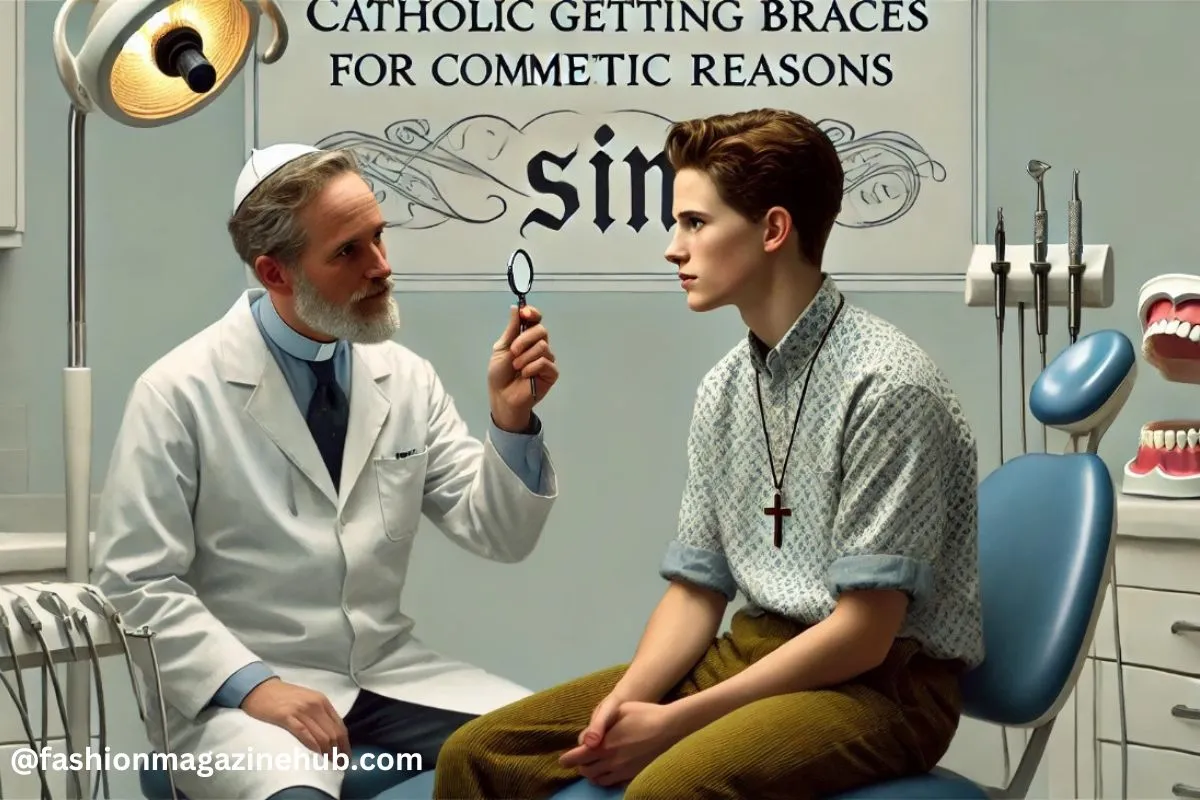Catholic Perspectives on Getting Braces For Cosmetic Reasons: A Moral Inquiry
The topic of Catholic Getting Braces For Cosmetic Reasons Sin presents a thought-provoking intersection of faith, ethics, and personal choice. As individuals navigate the complexities of enhancing their appearance, particularly through orthodontic treatments like braces, they often face moral dilemmas. The Catholic Church emphasizes the importance of intention and the impact of vanity on one’s spiritual life, making it essential for believers to reflect on their motivations.
In Catholic teachings, the focus is not merely on the act of getting braces but on the underlying reasons that drive this decision. Are individuals seeking braces to conform to societal beauty standards, or are they motivated by a genuine desire for self-improvement and enhanced confidence? Understanding these nuances is vital for those grappling with the moral implications of cosmetic procedures.
Moreover, the Church acknowledges the significance of personal dignity and self-care. While striving for beauty is not inherently sinful, excessive concern for one’s appearance can lead to distractions from spiritual growth. Therefore, the context and intentions behind seeking cosmetic enhancements play a crucial role in determining whether such choices align with Catholic values.
Understanding Cosmetic Changes In Catholicism
In Catholicism, cosmetic changes are viewed through the lens of moral theology. The Church encourages individuals to reflect on their motivations for altering their appearance. While the emphasis is placed on inner beauty, the Church acknowledges that some cosmetic procedures can be acceptable, especially if they align with health benefits or improve quality of life.
Moreover, the teachings stress the importance of humility and the cultivation of virtues such as kindness and compassion. Cosmetic changes should not distract from spiritual growth; rather, they should support it. Thus, the Church calls for a thoughtful approach to any decision regarding physical alterations.
Ultimately, understanding cosmetic changes in this faith involves balancing personal desires with spiritual values. Believers are urged to ensure that their choices promote both their well-being and their relationship with God, thereby fostering a deeper understanding of their faith.
The Dangers of Vanity In Catholic Teachings
Vanity poses significant concerns within Catholic teachings, as it can lead individuals away from their spiritual paths. The Church defines vanity as excessive pride in one’s appearance, which can detract from the pursuit of inner virtues. When individuals focus too much on their looks, they may neglect the development of qualities like humility and selflessness.
Additionally, vanity can foster a distorted self-image, where individuals value themselves based solely on external factors. This can create a sense of disconnection from one’s spiritual identity, leading to unhealthy comparisons with others. The Church warns that such distractions can hinder personal growth and spiritual maturity.
To combat the dangers of vanity, Catholic teachings encourage believers to cultivate inner beauty. By prioritizing virtues and focusing on personal character development, individuals can avoid falling into the trap of superficiality and enhance their relationship with God.
Intentions Behind Altering Appearance
The intention behind altering one’s appearance is critical in assessing the morality of cosmetic changes. In Catholic moral theology, the reasons for such alterations determine whether they align with the faith’s teachings. Seeking cosmetic procedures for valid health reasons is generally viewed as acceptable, while actions motivated by vanity or societal pressure may raise ethical concerns.
This emphasis on intention encourages individuals to reflect deeply on their desires. The Church advocates for self-examination to ensure that motivations stem from a genuine need for improvement rather than superficial desires. Understanding the underlying reasons can lead to more responsible decision-making.
Furthermore, this focus on intention aligns with the broader goal of spiritual growth. By prioritizing sincere motivations over societal expectations, individuals can make choices that resonate with their faith and enhance their spiritual journey.
Health Benefits vs. Aesthetic Improvements
In Catholic thought, the distinction between health benefits and aesthetic improvements is crucial. Procedures that address dental issues or other health concerns are generally viewed favorably. The Church emphasizes that enhancing one’s health is a noble pursuit, as it aligns with the principle of caring for the body as a temple.
Conversely, when cosmetic procedures are pursued solely for aesthetic reasons, they require more careful consideration. The Church encourages individuals to evaluate whether their desire for improvement is driven by vanity or a genuine need for enhancement. Such reflection can reveal deeper moral implications tied to the choice.
This distinction encourages believers to weigh their motivations against the teachings of the Church. By focusing on health and well-being, individuals can ensure their decisions align with their faith while avoiding the pitfalls of vanity and superficiality.
Reflecting on Personal Motivation For Braces
When considering orthodontic treatment, individuals are encouraged to reflect on their personal motivations. Understanding the reasons behind the desire for braces is essential in determining the morality of the decision. If the motivation is rooted in addressing significant dental issues or health concerns, the choice is generally seen as justifiable.
However, if the desire for braces stems from societal pressures or an excessive focus on physical appearance, the situation becomes more complex. The Church advocates for introspection, urging individuals to examine their hearts and intentions. This self-reflection helps ensure that choices align with personal values and spiritual beliefs.
By prioritizing genuine needs over superficial desires, individuals can make informed decisions about their health and appearance. This process not only respects their body but also fosters a deeper understanding of their faith and personal growth.
Moral Considerations of Cosmetic Procedures
Moral considerations play a significant role in decisions regarding cosmetic procedures within Catholicism. The Church teaches that individuals must evaluate the motivations behind such choices to determine their ethical standing. Procedures that serve a health-related purpose are generally viewed more favorably than those pursued purely for vanity.
Additionally, the Church encourages believers to consider the impact of their choices on their spiritual lives. If cosmetic changes detract from one’s relationship with God or promote vanity, they may warrant deeper moral scrutiny. This perspective underscores the importance of aligning actions with one’s faith and values.
Ultimately, engaging in thoughtful deliberation about cosmetic procedures allows individuals to make choices that resonate with their spiritual journey. By prioritizing moral integrity, they can navigate the complexities of appearance alterations while fostering growth in their faith.
Acceptable Circumstances For Getting Braces
Certain circumstances make getting braces more acceptable from a Catholic perspective. The Church recognizes that orthodontic treatment can serve both aesthetic and health-related purposes. When braces are used to correct significant dental issues, they are typically viewed as a necessary intervention.
In contrast, when braces are sought solely for cosmetic reasons, individuals are encouraged to reflect on their motivations. If the desire stems from societal pressure or an excessive focus on physical appearance, it may raise ethical concerns. The Church calls for believers to consider whether their choices promote spiritual growth and inner virtue.
Ultimately, understanding the acceptable circumstances for braces involves balancing personal needs with the teachings of the Church. By prioritizing health and well-being, individuals can make choices that resonate with their faith and contribute to their overall quality of life.
The Importance of Spiritual Guidance
Seeking spiritual guidance is vital when considering cosmetic procedures like braces. The Church encourages individuals to consult with spiritual leaders, such as priests or advisors, to ensure their decisions align with Catholic teachings. This guidance provides an opportunity for discernment and reflection on the moral implications of cosmetic changes.
Spiritual leaders can offer personalized insights, helping individuals evaluate their motivations and the broader context of their faith. Engaging in these conversations fosters a deeper understanding of the relationship between personal choices and spiritual beliefs. This process ensures that decisions are made thoughtfully and respectfully.
Ultimately, spiritual guidance serves as a valuable resource for navigating the complexities of cosmetic procedures. By consulting with trusted leaders, individuals can approach their decisions with clarity and confidence, reinforcing their commitment to their faith.
Influence of Societal Beauty Standards
Societal beauty standards exert a significant influence on how individuals perceive their own appearance. These standards are often shaped by media representations, celebrity culture, and prevailing trends that highlight specific ideals of beauty. This constant exposure can create a feeling of inadequacy among individuals who feel they do not measure up to these often unrealistic expectations.
As people strive to align themselves with societal norms, they may find themselves contemplating cosmetic changes, such as braces. The desire to achieve a certain aesthetic can lead to decisions that prioritize outward appearance over inner virtues. For instance, when contemplating the moral implications of Catholic getting braces for cosmetic reasons sin, individuals must evaluate whether their motivations stem from genuine needs or superficial desires driven by societal pressures.
Moreover, these societal standards can contribute to mental health challenges, including anxiety and low self-esteem. Individuals often engage in unhealthy comparisons, leading them to focus excessively on their physical flaws. This preoccupation with appearance can distract from personal growth and spiritual development, as the emphasis on conforming to beauty standards can overshadow deeper qualities such as kindness and humility.
The Catholic Church encourages individuals to reflect on their motivations and to seek a balance between personal desires and spiritual values. It emphasizes the importance of inner beauty and character over outward appearance. By recognizing the impact of societal beauty standards, individuals can cultivate self-acceptance and embrace their uniqueness, rather than striving for conformity to external ideals.
Ultimately, the influence of societal beauty standards underscores the need for critical reflection on personal values and choices. Individuals are encouraged to prioritize their mental and spiritual well-being over fleeting societal trends. This approach fosters a healthier relationship with their self-image and empowers them to navigate the pressures of beauty standards with confidence and authenticity.
Balancing Personal Appearance With Spiritual Values
Finding a balance between personal appearance and spiritual values is crucial for holistic well-being. Many people feel societal pressure to meet specific beauty standards, which can lead to prioritizing external aesthetics over internal virtues. It’s essential to reflect on what truly matters—fostering kindness, humility, and compassion rather than obsessing over one’s looks.
When personal appearance becomes an obsession, it can divert attention from spiritual growth. Individuals may invest significant time and resources into their appearance, leaving little room for self-reflection or personal development. Striking a balance means recognizing that while it’s natural to want to look presentable, it should not overshadow the importance of nurturing one’s spirit and character.
The Catholic tradition encourages believers to focus on virtues that reflect inner beauty, promoting a deeper connection with God. This perspective suggests that one’s worth is not determined by physical attributes but by the qualities of the heart and soul. Therefore, individuals should evaluate their motivations behind cosmetic choices and ensure they align with their spiritual values.
Incorporating practices such as prayer and meditation can help individuals maintain this balance. These practices foster a sense of peace and self-acceptance, allowing one to appreciate their unique qualities while also striving for self-improvement. Ultimately, the goal is to achieve a harmonious relationship between how one presents themselves and their spiritual journey.
By prioritizing spiritual values, individuals can cultivate a more meaningful understanding of beauty that transcends societal expectations. This approach empowers them to embrace their individuality and find confidence in their true selves, leading to a fulfilling life grounded in both personal and spiritual growth.
Impact of Cosmetic Enhancements on Self-Perception
Cosmetic enhancements can significantly influence an individual’s self-perception and overall confidence. Many people seek these procedures hoping to improve their appearance, which can lead to feelings of satisfaction and increased self-esteem. However, the impact of these changes often extends beyond the physical, affecting how individuals view themselves and their worth.
While some may find that enhancements boost their confidence, others may experience mixed feelings. For instance, a person might feel pressure to maintain a particular look or worry about societal judgment, which can create anxiety. This highlights the importance of understanding the potential psychological effects of cosmetic procedures and recognizing that self-worth should not be solely tied to appearance.
Additionally, cosmetic enhancements can shift an individual’s focus toward external validation. People may start to rely on compliments and admiration from others as their primary source of self-esteem, leading to an unstable sense of self-worth. This reliance on external approval can detract from personal growth and spiritual development, as individuals may neglect their inner qualities in favor of surface-level attributes.
Furthermore, the relationship between cosmetic enhancements and self-perception is complex. While some individuals report feeling more authentic and aligned with their self-image post-procedure, others might struggle with feelings of emptiness if their self-worth remains tied to physical appearance. It is essential to approach cosmetic changes with a balanced perspective, ensuring that one’s sense of identity encompasses more than just looks.
Ultimately, fostering a healthy self-perception requires a focus on inner values and qualities. While cosmetic enhancements can provide temporary boosts in confidence, individuals should prioritize developing their character, virtues, and spirituality. This holistic approach encourages a deeper understanding of self-worth that transcends physical appearance, leading to a more fulfilling life.
Personal Choices and Catholic Beliefs
Personal choices, particularly those related to appearance, can significantly intersect with Catholic beliefs. The Church encourages individuals to reflect on their motivations when considering cosmetic procedures. This reflection is crucial in determining whether choices align with one’s faith and spiritual values.
Catholic teachings emphasize the importance of humility and inner beauty, suggesting that personal appearance should not be prioritized over character development. When individuals make choices based on societal pressure or vanity, they may inadvertently stray from the core values that their faith promotes. It’s essential for Catholics to consider whether their decisions reflect a commitment to their beliefs or simply a desire for conformity.
Moreover, personal choices should ideally enhance one’s ability to live out their faith. For example, a person may choose to undergo a cosmetic procedure for valid medical reasons, such as correcting dental issues, which the Church generally accepts. However, if the decision stems from an excessive concern for appearance, it may require deeper contemplation regarding its alignment with Catholic teachings.
Consulting spiritual leaders can provide valuable insight for those grappling with these choices. Guidance from a priest or spiritual advisor can help individuals navigate the moral implications of their decisions, ensuring that their actions resonate with their faith. This consultation can serve as a tool for self-reflection and discernment, promoting a deeper understanding of how personal choices relate to spiritual values.
Ultimately, individuals are encouraged to align their choices with the teachings of their faith, fostering a lifestyle that prioritizes both personal integrity and spiritual growth. By doing so, they can cultivate a more meaningful existence that reflects their values, leading to a harmonious relationship between appearance and beliefs.
Common Misconceptions About Cosmetic Procedures
Misconceptions about cosmetic procedures often cloud the public’s understanding of their moral and ethical implications. Many people believe that all cosmetic enhancements are inherently wrong or sinful, which oversimplifies a complex issue. It is important to recognize that the morality of such procedures depends largely on the individual’s intentions and the context of their decisions.
One common misconception is that undergoing cosmetic procedures signifies a lack of self-acceptance. While some individuals may indeed pursue enhancements from a place of insecurity, others approach them as a form of self-care or personal expression. This distinction is crucial, as it highlights that cosmetic choices can stem from various motivations, including valid health concerns or the desire for personal improvement.
Another misunderstanding is that the Church outright condemns all forms of cosmetic enhancement. In reality, Catholic teachings focus on the intention behind the action rather than the action itself. Procedures that address medical issues or significantly improve a person’s quality of life are often viewed positively. Conversely, enhancements pursued solely for superficial reasons may warrant moral scrutiny.
Additionally, the belief that cosmetic procedures guarantee happiness is a fallacy. While enhancements may provide temporary satisfaction, true contentment comes from inner peace and spiritual fulfillment. Individuals are encouraged to reflect on their motivations and consider whether these procedures contribute to their overall well-being or merely serve as a fleeting solution to deeper insecurities.
Ultimately, addressing these misconceptions is vital for fostering a more nuanced understanding of cosmetic procedures. By focusing on intentions and individual circumstances, people can make informed decisions that align with their values and beliefs. This approach encourages a healthy dialogue about beauty, self-acceptance, and the moral implications of altering one’s appearance.
Fostering Spiritual Growth Over Physical Appearance
Fostering spiritual growth is a fundamental aspect of a fulfilling life, often overshadowed by societal emphasis on physical appearance. While taking care of one’s body is important, it should not come at the expense of developing one’s character and virtues. The focus on spiritual growth encourages individuals to prioritize qualities like kindness, compassion, and humility over superficial attributes.
Spiritual growth involves cultivating a deeper relationship with oneself and with God. This journey often requires introspection and self-reflection, allowing individuals to identify areas for improvement in their character. By engaging in practices such as prayer, meditation, and community service, people can nurture their spiritual lives, leading to a more profound sense of purpose and fulfillment.
Moreover, prioritizing spiritual growth can help individuals navigate the pressures of societal beauty standards. When one’s self-worth is rooted in spiritual and moral values, external opinions about appearance carry less weight. This shift in focus enables individuals to appreciate their uniqueness and embrace their inherent worth, fostering a sense of confidence that is not reliant on physical appearance.
Additionally, spiritual growth encourages individuals to develop resilience in the face of challenges. Life’s adversities often lead to personal transformation, allowing people to emerge stronger and more grounded in their values. By focusing on spiritual development, individuals can cultivate a mindset that prioritizes inner strength and growth over fleeting societal standards of beauty.
Ultimately, fostering spiritual growth leads to a more meaningful existence. By emphasizing the development of inner qualities, individuals can create a balanced approach to life that values both their physical appearance and their spiritual journey. This holistic perspective promotes true fulfillment and encourages a deeper connection with oneself and others.
The Last Word
The question of Catholic Getting Braces For Cosmetic Reasons Sin revolves around the intricate relationship between personal appearance and spiritual values. At the heart of Catholic teachings is the emphasis on intention. When individuals consider braces for purely cosmetic reasons, they must evaluate whether their motivations stem from vanity or a genuine desire to enhance their self-esteem without compromising their spiritual integrity. The Church advocates for humility and the cultivation of inner beauty, warning against excessive pride in one’s outward appearance.
Additionally, the Catholic Church acknowledges the importance of personal dignity and self-care. For many, improving one’s smile through braces can significantly boost confidence, thereby positively influencing their overall spiritual journey. If the desire for braces stems from a wish to feel better about oneself and not simply to conform to societal beauty standards, it may be deemed a healthy choice rather than a sinful one.
Furthermore, context matters. If braces are necessary for health reasons, such as correcting dental issues, the moral implications shift. The Church typically supports actions that promote well-being and dignity, so pursuing braces for medical reasons is often seen as an acceptable choice. This distinction between cosmetic enhancement and necessary medical intervention is crucial in the moral evaluation.
Ultimately, the decision to get braces for cosmetic reasons should involve thoughtful reflection and discernment. Catholics are encouraged to pray, seek guidance from spiritual leaders, and carefully assess their motivations. By focusing on spiritual growth and personal values, individuals can navigate this moral issue while aligning their choices with their faith.
Thank you for exploring our Blog! For additional captivating content, feel free to explore the website.


















Post Comment